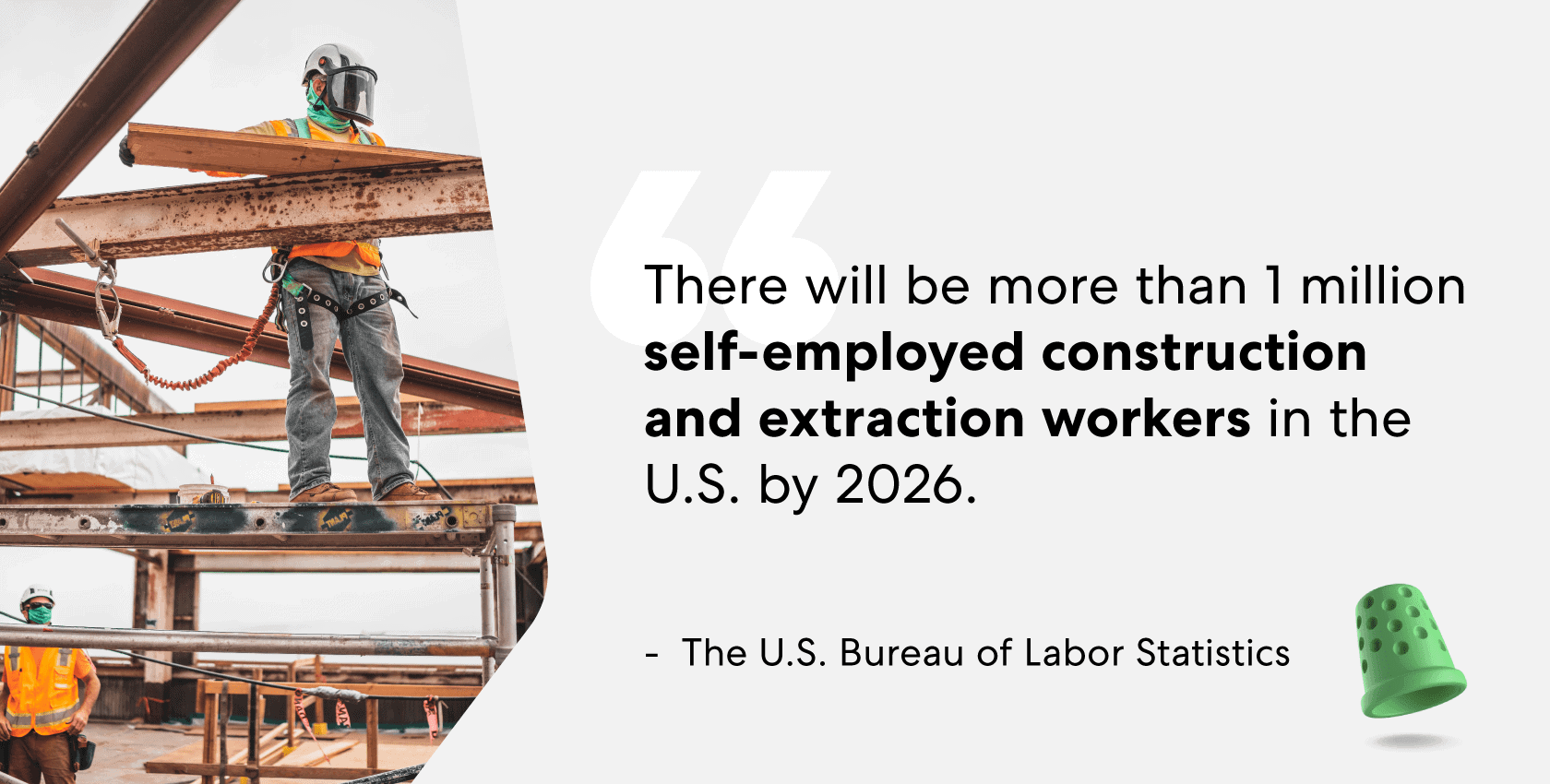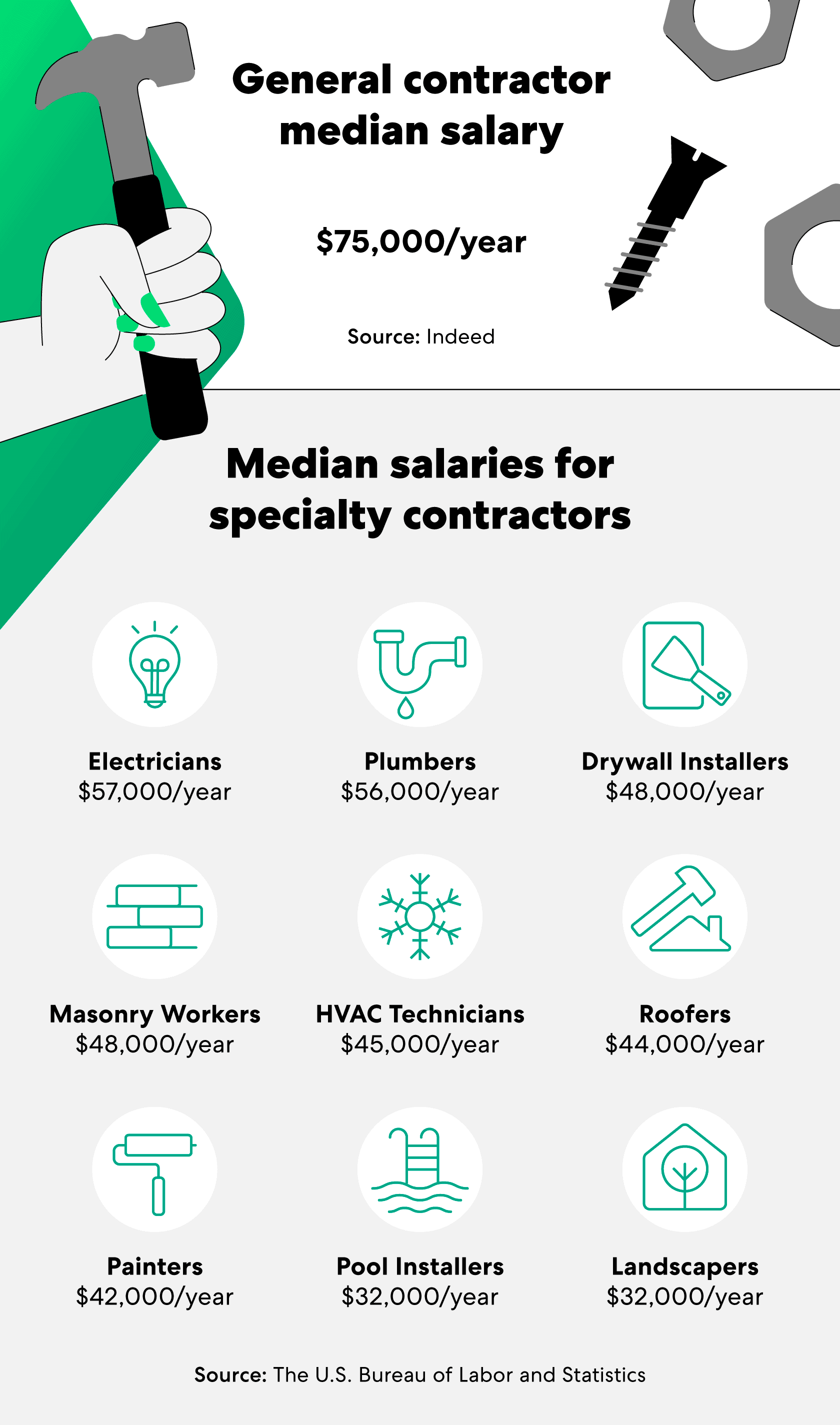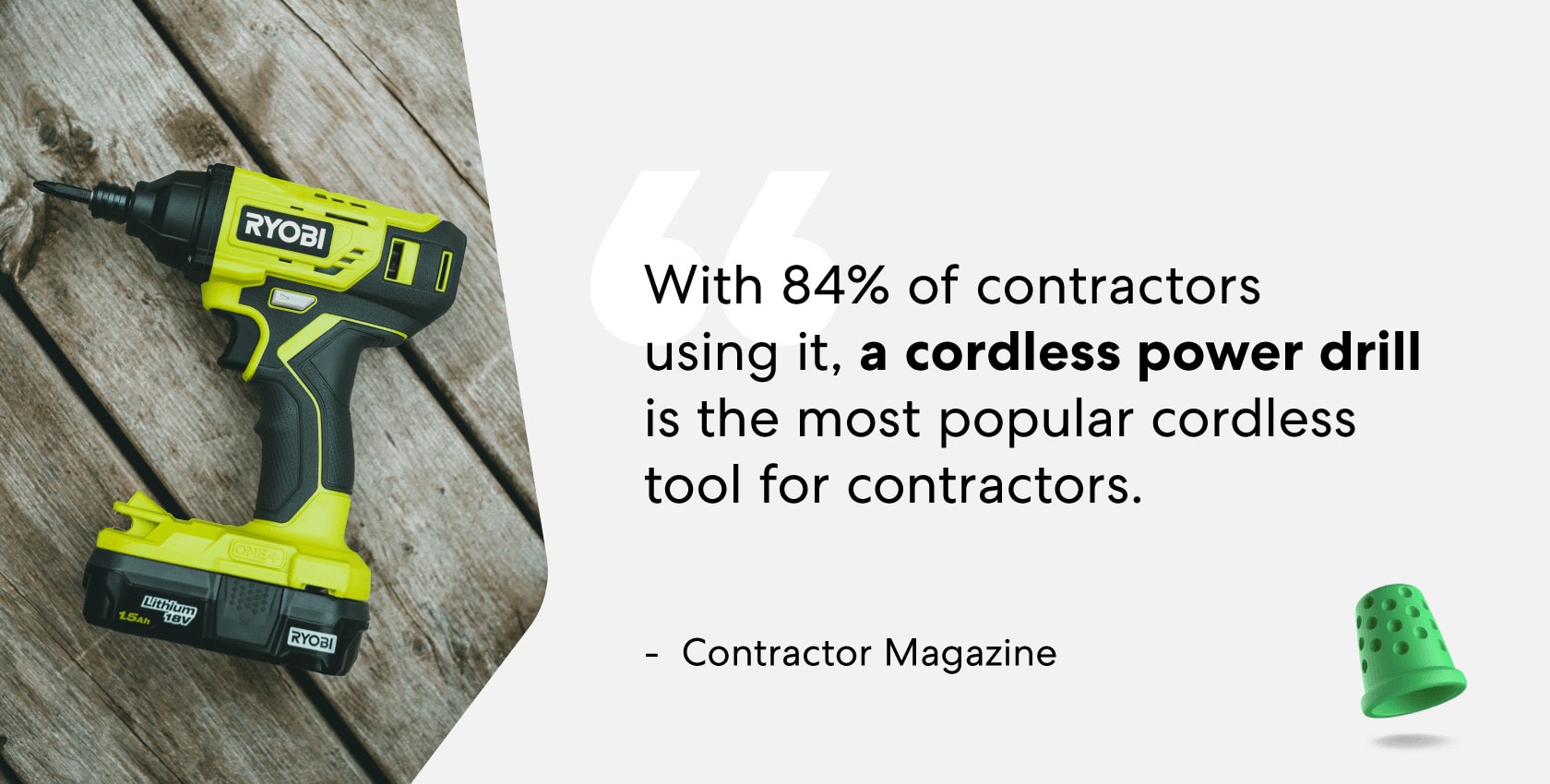As long as there are homes standing, there is going to be a need for people who know how to fix them. That’s where contractors come in. With all the DIY know-how and experience to boot, contractors can take on jobs in the construction industry to help make these repairs and execute these remodels without being an employee of a formal construction company.
Becoming a contractor can be extremely lucrative. It’s projected that there will be more than 1 million self-employed construction and extraction workers in the United States in 2026.1 Ranging from electricians to painters and plumbers, self employed construction workers can quite literally wear several different hats.
Below, we’ll break down how to become a contractor in the construction industry.

1. Determine what type of contracting you’re interested in
The first step to becoming a contractor is deciding which type of contractor you want to be. With many different types of home improvement projects and construction needs, there are few different types of specializations to choose from.
General contractors
General contractors oversee work sites and keep things organized. You’ll see a general contractor on jobs ranging from home remodels to large-scale builds for companies or businesses. Typically, they handle the client-facing interactions and make sure the work is being completed on time and within budget. They coordinate the logistics of the job site, and focus more on the behind-the-scenes work than the actual building or repairing.
Subcontractors
Subcontractors are those who work under the general contractor. They do the handiwork, but don’t typically see the client face-to-face. It’s important to note that though subcontractors work under a general contractor, they typically aren’t the general contractor’s employees. Unless the general contractor sets the subcontractor’s hours, provides their equipment and pays them by the hour, the subcontractor is still independent.2
Think of it this way: if a general contractor is overseeing a home remodel, they can hire one person to install the HVAC system and another to fix the plumbing. These are independent subcontractors working under this general contractor on the home, but who aren’t employed long-term by that contractor.
Specialty contractors
A specialty contractor is trained for one specific type of construction or maintenance job. It might seem like putting all of your nails in one toolbox, but becoming a specialty contractor can make you an expert authority on your specific trade. Specialty contractors are often the go-to for general contractors or clients looking to hire.
Different states and municipalities will have different requirements for speciality contractor qualifications, but licenses are required for these trades more often than not. If you want to specialize in HVAC installation and repair, electric work or plumbing, you’ll pretty much always need to get a license or pass an exam no matter what state you live in.
Direct contractors
Direct contractors are those who offer more than one type of work and have direct contact with the property owner or client. These contractors could do everything from paint walls to remove and install floors, and are in charge of their own work schedules and job completion.
Essentially, direct contractors are subcontractors that work without the middle man. They are hired to complete one or more specific tasks, and they do so without reporting to a general contractor while they’re getting the job done.
Rather than hire a general contractor, a client may choose to hire several direct or specialty contractors to do the work. These people will report directly to them while being in charge of their own organization and site logistics.
2. Complete any necessary training
General contractors
All general contractors will need to pass a licensing exam before they begin working. Some may even choose to get a bachelor’s degree in a related field like construction management, civil engineering or construction science, but it isn’t necessary. And since the field is so dynamic, the qualifications for this work depends largely on where you live and what you want to do. But in general, if you want to be a general contractor you’ll need a high school diploma and a passing exam grade.
There isn’t a universal general contractor’s exam, but the NASCLA exam is accepted in 16 U.S. states or territories. To find the general contractor exam for your state, you may need to go online and conduct a search.
Specialty contractors
Those looking to work in specialty contracting may need to attend trade school, pass an exam or work an apprenticeship before they can get started on their own. Typically, you can expect to take an exam if you want to work in:
- HVAC
- Electricity
- Plumbing
- Roofing
Just like general contractors, the state requirements for each of these trades varies by state and how much work you want to do.
And beyond that, many specialty contractors will be required to gain experience by working under a licensed contractor before they can get licensed themselves.

3. Create a business plan
Just like any business, you’ll want to go into contracting with a clear vision and plan. That means creating a thorough business plan to help you analyze your competition, potential customer base and how you’ll connect with your ideal market.
The first step to a business plan is picking a name and writing a mission statement. Though some contractors simply opt to use their last name, others go for something more creative. Whatever you choose, your name and mission statement should give a clear idea of who you are and what you have to offer.
From there, look into your competitors to see what they’re offering and how you can level up against the competition. Analyze their pricing, time scheduling and service guarantees, and brainstorm ways to match or up-level your own offerings.
It’s a good idea to analyze your market to gain insights on what consumers need. This can help you determine your service offerings. Are you trying to service large, suburban homes, urban condos and apartments, or a mix of both? Think about the demographic you’re trying to hit, and then center your messaging and services around what will get you there.
A good business plan will include:
- Company name and description
- Market analysis
- Organizational structure
- Marketing plan
- Financial plan
4. Obtain a business license
Whether or not you need a business license is up to your state. But as a general rule, it’s a good idea to invest in one regardless of whether or not it’s actually required. A business license can legitimize your business, help with marketing and let your customers know that you are trustworthy and devoted.
And even if a state doesn’t require you to be licensed, the city you want to operate in may. For example, the state of Texas doesn’t require contractors to get their licenses, but you’ll need one to operate in Austin, Dallas or Houston. And if you want to work with HVAC, plumbing or electric, you’ll need one regardless.
Search for license requirements in your state to determine what you need to do to get licensed — or visit the National Association of State Contractors Licensing Agencies.
5. Get insured
Business insurance is always important, but especially so for contractors who are doing potentially dangerous work inside of people’s homes or businesses.
The most important type of coverage for contractors is General liability insurance, which will cover the majority of the risks that a contractor may encounter on the job. These include bodily injury to someone who isn’t your employee, slip and fall accidents, and property damage. So, general liability insurance would be your go-to from everything from a client stepping on a rogue nail to a piece of equipment damaging a home or car.
What’s more, most states also require it for a contractor to receive a business license.
6. Start contracting!
With all the papers signed and business dealings done, it’s time to start building your business. Crossing that first threshold and getting your first sale is an exciting first step to becoming a bonafide business.
From your first job, you’ll want to make sure you have a good system in place to attract and retain customers. Set up Google pages and Yelp accounts for your business and encourage customers to leave reviews. These reviews can showcase the efficiency of your work, but can also help improve your search engine rankings, moving your company higher up on local searches for service.
And with quality work and reviews to prove it, you’ll soon have more contracts lined up.
How long does it take to become a contractor?
It’s going to take about 3-5 years. No matter what route you take, you’ll most likely need to get a few years of experience under your belt before you can get your license, whether you’re opting for a general contractor’s license or a speciality one.
For example, residential plumbers in Colorado must show two years of relevant experience before they can get their plumbing license, while residential plumbers in Arizona must complete an apprenticeship program with at least 6,000 hours of training.
Factor in education time for trade school or a bachelor’s degree program, and you’re looking at several years to go from studying to building a stud wall.
How to become a general contractor with no experience
Unlike speciality or direct contractors who will need experience hours or an apprenticeship to get licensed to work, general contractors don’t necessarily need time out on the field before they begin working.
Since most states will require general contractors to get licensed, all you’ll need to do is prepare yourself to pass the licensing exam. You can do this by looking online for the exam materials and studying up, or enrolling in a study course. The Associated General Contractors of America offers a training course for those looking to pass the exam without working in the field.
What qualifications do contractors need?
General contractors
Those looking to become general contractors will have heavier requirements than those looking to do sub or direct contracting. Typically, general contractors are held to the following criteria:
- At least 18 years of age
- Have a high school diploma
- Have a few years of experience working for construction companies
- Be able to legally work in the United States
Direct and subcontractors
Since independent contractors are in business for themselves and aren’t working for an employer, there usually aren’t requirements about age or education status that determines whether someone is able to work. Given the nature of working in maintenance or construction, the only real qualifications that an independent contractor needs is the ability to get the job done quickly, safely and correctly.
All contractors
A business license and registration will usually be required by that state you choose to operate in. And for specialty contractors, licenses are almost always required for certain trades. The most regulated trade is asbestos abatement, which requires a license in 48 states. But most states also require licenses for plumbing, electrical and HVAC work.4
You’ll also need to register your business name on a local level if you want to be able to enforce any contracts you create or open a business bank account.5 Independent contractors can skip this step if they include their full name in their business name, which allows you to operate without registering the name.
As far as obtaining a business license is concerned, most states and cities will require one for certain types of work. But even for the ones that don’t, getting one is a good idea to legitimize your business and keep you safe just in case.
You’ll need to contact your local business licensing offices to discuss your options. To find your state or city licensing agency, web search your location + “business licensing.”
In general, contractors can expect to need the following before they can get started:
- Proper training or education
- A registered business name
- A business license
- General liability insurance
How to generate leads as a contractor
Chances are you won’t be the only plumber or electrician in town. So how do you get customers to hire you instead of the other companies? It all comes down to making connections and doing quality work.
If you make a connection with a local real estate company, property manager or apartment complex, you can offer to be their primary contact in the event one of their properties needs maintenance or remodeling. You can also use work you do to your advantage by asking your clients to recommend your business to anyone they know who needs a repair. And when the job is complete, ask them to leave you a review.
You can also use your local area to your advantage. Go online to scout work via apps like TaskRabbit or websites like Craigslist. You can also put a decal with your service offerings and phone number on your service truck to attract attention while you drive.

Must-have tools for contractors
Just as a brain surgeon can’t operate without a scalpel or an English teacher can’t teach without books, a contractor can’t complete their job without their toolbox. A toolbox is a contractor’s right-hand, and will have all of the tools and equipment they need to succeed stored inside.
As far as power tools are concerned? Drills are king. According to a survey by Contractor Mag3, the most used corded power tool was a hammer drill, with 87% of survey respondents saying they used this tool. And for cordless tools, the most popular was a power drill, used by 84% of respondents.
Beyond drills, here are other must-haves to pad your toolbox:
- Hammer
- Tape measure
- Adjustable wrench
- LevelScrewdriver
- Utility knife
- Sticky notes
- Scissors
- First-aid kit
- Pens and markers
- Protective goggles
- Hat or bandana
5 must-download apps for contractors
Apps can be helpful tools for people who work in construction or remodeling to find new clients. From handymen to contractors, these apps can help construction professionals with invoicing, planning and even getting gas! Let’s dive into some must-download apps.
For planning: PlanGrid
Available on: iOs, Android
Cost: Tiered levels starting at $50/month
PlanGrid allows contractors to keep track of blueprints, punch cards, daily reports and other important documents without having to carry around physical copies. Contractors can use the app to share and comment on construction plans, which can help streamline processes and make the project go smoother.
For tracking: DEWALT Tool Connect
Available on: iOs, Android
Cost: Free with purchase of a Tool Connect tool
Similar to devices that can help you find a lost wallet or phone, DEWALT’s Tool Connect can help you keep track of your tools. When you buy a connected tool, you can track it via the app to make sure it’s always right where you need it. If you have older tools that aren’t Tool Connect tools, you can also buy a tag to attach to the tool that can be tracked on the app. You can also use this app for inventory management and to see battery levels.
For refueling: GasBuddy
Available on: iOs, Android
Cost: Free
It’s a simple concept: GasBuddy can help you find cheap gas. But for contractors driving to and from job sites or using gas-powered tools like saws, generators or air compressors, this app can be a serious moneysaver. The app will tell you the cheapest gas in your area, and even includes challenges that can help you win free gas.
For accounting: QuickBooks
Available on: iOs, Android
Cost: Tiered levels starting at $7.50/month
Gone are the days of handwritten invoices and trying to manually keep track of payments and cash flow. The QuickBooks app can crunch those numbers for you, allowing you to spend more time on the job site and less time poring over a ledger. The app is tiered, so you can only pay for what you need. But even the most basic package that was developed for self-employed people allows you to invoice and receive payments, track and bill mileage and track income and expenses.
For management: GoCanvas
Available on: iOs, Android, Windows
Cost: Free, with in-app purchases
GoCanvas aims to help its users eliminate paperwork. With the app, contractors can create estimates, work orders, inspections and invoices without needing to create and print these forms online. The app can also collect customer signatures to get those invoices and estimates signed from the field. And in the event your job site is out of a service area, it works offline, too.
Becoming a contractor is a great foundation for the rest of your life. But just as you wouldn’t build a home on shaky ground, you don’t want to build your business without the confidence that you’re protected. Join the thousands of other contractors who have gotten coverage from Thimble to make sure your business is protected for the long haul.
For more information on becoming a contractor, check out our infographic.

Sources:











